 In this blog post our thought leaders’ favorite books are featured. They all have written about a book they think other people should read. The works mentioned are divergent: from works of poetry to philosophical literature. We hope to inspire you with this list for Christmas and New Year gifts!
In this blog post our thought leaders’ favorite books are featured. They all have written about a book they think other people should read. The works mentioned are divergent: from works of poetry to philosophical literature. We hope to inspire you with this list for Christmas and New Year gifts!
1. Jan Weiler, Maria, ihm schmeckt’s nicht! (2003)
Dean Paul Matthyssens
 Italy and the Italian culture have always intrigued me. Maria, ihm schmeckt’s nicht is a book about the experiences and wonderment of a German who marries a South Italian woman and meets the (extensive) family for the first time after taking a long vacation. Another book about Italy that I recommend is Thomas Siffer’s Intermezzo Italiano (2013). It’s a non-fiction book about Siffer himself, who throws his top function overboard to go on a sabbatical in southern Italy in a somewhat woeful village. He transmits an ambiguous feeling to his readers: the exasperation about what doesn’t work and at the same time the joy of how beautiful dolce far niente can be.
Italy and the Italian culture have always intrigued me. Maria, ihm schmeckt’s nicht is a book about the experiences and wonderment of a German who marries a South Italian woman and meets the (extensive) family for the first time after taking a long vacation. Another book about Italy that I recommend is Thomas Siffer’s Intermezzo Italiano (2013). It’s a non-fiction book about Siffer himself, who throws his top function overboard to go on a sabbatical in southern Italy in a somewhat woeful village. He transmits an ambiguous feeling to his readers: the exasperation about what doesn’t work and at the same time the joy of how beautiful dolce far niente can be.
2. Ronald Giphart & Mark van Vugt, Mismatch (2016)
Lars Moratis, Thought Leader Corporate Social Responsibility
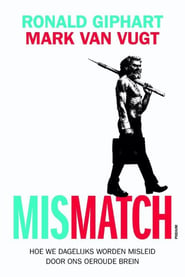 The starting point of this book is the discovery that there is a mismatch between the human brain (which hasn’t changed much over a long time) and the environment in which people live (which has changed a lot in a short time). In terms of durability, this means we are trying to solve complex social issues with a ‘Stone Age brain’. Simply put, this is a rather difficult task, because we are biologically preprogrammed for other environments. The questions this book raises, are: Can we undo this mismatch? Or at least learn to use it in a valuable manner? How can we learn to understand and use those characteristics of our evolved brain in order to be successful and behave durably? In the end, it seems to work out if we come up with creative solutions.
The starting point of this book is the discovery that there is a mismatch between the human brain (which hasn’t changed much over a long time) and the environment in which people live (which has changed a lot in a short time). In terms of durability, this means we are trying to solve complex social issues with a ‘Stone Age brain’. Simply put, this is a rather difficult task, because we are biologically preprogrammed for other environments. The questions this book raises, are: Can we undo this mismatch? Or at least learn to use it in a valuable manner? How can we learn to understand and use those characteristics of our evolved brain in order to be successful and behave durably? In the end, it seems to work out if we come up with creative solutions.
3. Martha Nussbaum, Anger and Forgiveness (2016)
Koen Marichal, Thought Leader Leadership
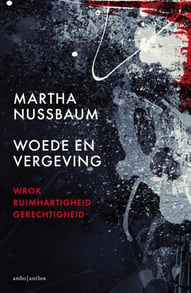 At the moment, I’m reading books which help me understand what is happening in the world and how I should react to those changes. During the summer, I devoured Martha Nussbaum’s book, The New Religious Intolerance. Her last, Anger and Forgiveness, certainly lays beneath my Christmas tree. Her writing is approachable and witty without lapsing into platitudes. Her view is wide and she easily jumps back and forth between the big ideas of the great Greek philosophers and their contemporary civilization issues. An ideal counterweight for the spur of the moments and the rational management sciences.
At the moment, I’m reading books which help me understand what is happening in the world and how I should react to those changes. During the summer, I devoured Martha Nussbaum’s book, The New Religious Intolerance. Her last, Anger and Forgiveness, certainly lays beneath my Christmas tree. Her writing is approachable and witty without lapsing into platitudes. Her view is wide and she easily jumps back and forth between the big ideas of the great Greek philosophers and their contemporary civilization issues. An ideal counterweight for the spur of the moments and the rational management sciences.
4. Jeremy Rifkin, The Zero Marginal Cost Society (2014)
Dorinela Munteanu, Thought Leader International Business
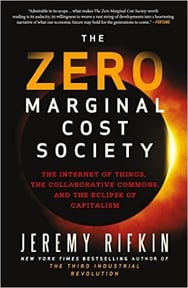 Because of technology and the upcoming Internet of Things the costs to manufacture an additional product is almost reduced to ‘0’, which makes further products and services ‘almost free’. How and which companies still make a profit in the era of Common Goods? How can be invested in product development? This book doesn’t offer final and all-encompassing answers, but makes you question and reflect upon our current revenue models and the technological revolution we are going through. I think it’s a very interesting book, maybe due to my experience with various economical systems around the globe and my interest in new possible forms of organization and revenue models worldwide, certainly under influence of technology.
Because of technology and the upcoming Internet of Things the costs to manufacture an additional product is almost reduced to ‘0’, which makes further products and services ‘almost free’. How and which companies still make a profit in the era of Common Goods? How can be invested in product development? This book doesn’t offer final and all-encompassing answers, but makes you question and reflect upon our current revenue models and the technological revolution we are going through. I think it’s a very interesting book, maybe due to my experience with various economical systems around the globe and my interest in new possible forms of organization and revenue models worldwide, certainly under influence of technology.
5. Toon Tellegen, Ik denk (‘I think’)
Ans De Vos, Thought Leader HR & Organizational Development
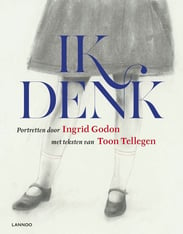 My three favorite books at the moment are not real books, but three volumes of poetry by Toon Tellegen which are beautifully illustrated by Ingrid Godon. I think, I must, and I wanted [Ik denk, Ik moet and Ik wil] are all accessible for children and adults with texts which activate us to reflect upon what you “think, want, and must”. That fits beautifully with our mission pillar self-awareness and is the core of what we aim at with are Leadership & Career Development Track (LCDT) in the FT-masters.
My three favorite books at the moment are not real books, but three volumes of poetry by Toon Tellegen which are beautifully illustrated by Ingrid Godon. I think, I must, and I wanted [Ik denk, Ik moet and Ik wil] are all accessible for children and adults with texts which activate us to reflect upon what you “think, want, and must”. That fits beautifully with our mission pillar self-awareness and is the core of what we aim at with are Leadership & Career Development Track (LCDT) in the FT-masters.
6. Maud Vanhauwaert, Ik ben mogelijk (‘I am possible’) (2001)
Maka De Lameillieure, Thought Leader Business Design & Innovation
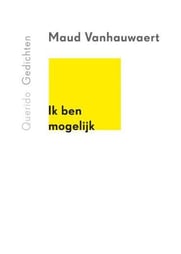 I recommend this book to everyone who wants to take a look at the world through different glasses. Maud has a wayward, slightly surreal look on everyday objects and situations. With striking images, she paints the portraits of various characters who are looking for their place in life. Surprising formulations and combinations of insights can be found abundantly in her debut. I think it’s lovely she looks in a relativistic way at herself and her poems. She always provides room for her readers’ interpretation: the holes in her poems are to be filled with our fantasy.
I recommend this book to everyone who wants to take a look at the world through different glasses. Maud has a wayward, slightly surreal look on everyday objects and situations. With striking images, she paints the portraits of various characters who are looking for their place in life. Surprising formulations and combinations of insights can be found abundantly in her debut. I think it’s lovely she looks in a relativistic way at herself and her poems. She always provides room for her readers’ interpretation: the holes in her poems are to be filled with our fantasy.
7. Philippe Bailleur, Trauma in organisaties (‘Organizational Trauma’) (2016)
Vincent Molly, Thought Leader Family Business
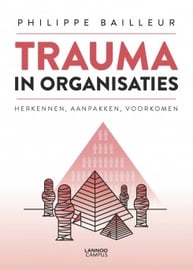 This book was only recently published, on the 6th of December to be precise. I was at this book’s launch night. It’s a book which touches me, because it centers around a theme with which many companies are confronted. It can have such a great impact on the whole organizational system, which makes everything to go wrong, but which rarely receives any attention. A unique book which is also something special within in international context. Undoubtedly a theme that we will read a lot about in the future.
This book was only recently published, on the 6th of December to be precise. I was at this book’s launch night. It’s a book which touches me, because it centers around a theme with which many companies are confronted. It can have such a great impact on the whole organizational system, which makes everything to go wrong, but which rarely receives any attention. A unique book which is also something special within in international context. Undoubtedly a theme that we will read a lot about in the future.
8. Karel Capek, War with the Newts (1936)
Sofie Jacobs, Thought Leader Creative Industries
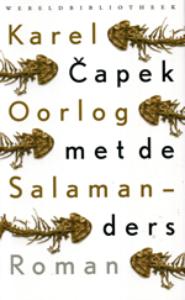 Karel Capek's War with the Newts is a book I read this past summer. It is an old book and it made a great impression on me. It first appeared in 1936, but it was only more recently translated to Dutch. In my opinion, it is an absolute gem; a somewhat estranging book that hilariously exposes the politics of the time (Nazism) and most of all, capitalism. Furthermore, the story is told from a number of different perspectives. The narrative: the discovery of a new usable species leads to blatant exploitation and an eventual annihiliation of humanity - as a result of hubris. It is a book that hasn't exactly been granted much attention, even though it inspired works such as George Orwell's Animal Farm.
Karel Capek's War with the Newts is a book I read this past summer. It is an old book and it made a great impression on me. It first appeared in 1936, but it was only more recently translated to Dutch. In my opinion, it is an absolute gem; a somewhat estranging book that hilariously exposes the politics of the time (Nazism) and most of all, capitalism. Furthermore, the story is told from a number of different perspectives. The narrative: the discovery of a new usable species leads to blatant exploitation and an eventual annihiliation of humanity - as a result of hubris. It is a book that hasn't exactly been granted much attention, even though it inspired works such as George Orwell's Animal Farm.
More tips?
- Ans is also recommending 5 must-reads about HR and career development!
- Vincent is also recommending 5 must-see videos about inspiring businesses!


